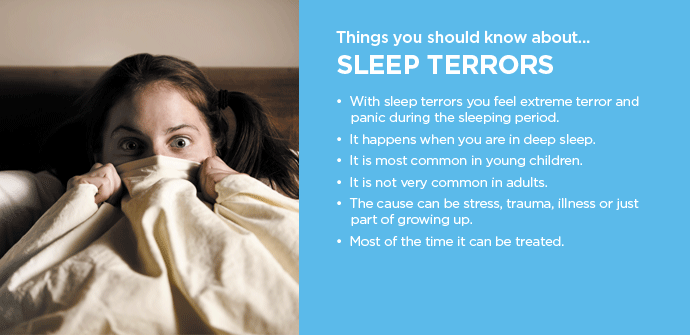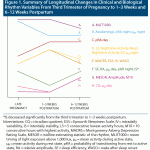Are you wondering what causes night terrors in adults? It’s a topic that can leave you feeling a little spooked, but fear not! I’m here to shed some light on this mysterious phenomenon. Night terrors, also known as sleep terrors, are intense episodes of fear that occur during sleep. They can cause a person to wake up in a state of panic, often screaming or thrashing around. While night terrors are more commonly associated with children, they can also affect adults. So, what exactly causes these unsettling experiences?
When it comes to night terrors in adults, there are several potential factors at play. One possible cause is stress or anxiety. When we’re under a lot of pressure or dealing with emotional turmoil, it can disrupt our sleep and lead to episodes of night terrors. Additionally, certain medications, such as sedatives or antidepressants, may increase the likelihood of experiencing these nighttime frights. Another possible culprit is sleep deprivation. When we don’t get enough quality sleep, our brain’s ability to regulate emotions and process information can be compromised, potentially triggering night terrors. Finally, underlying sleep disorders, such as sleep apnea or restless leg syndrome, could also contribute to these unsettling episodes. So, if you find yourself waking up in a cold sweat, it may be worth exploring these potential causes and seeking help if needed.
Night terrors are a type of sleep disorder that can affect both children and adults. While they are more commonly associated with children, adults can also experience night terrors, which can be distressing and disruptive to sleep. In this article, we will explore the causes of night terrors in adults and provide insights into how they can be managed.
One possible cause of night terrors in adults is a disruption in the sleep cycle. Night terrors usually occur during the non-rapid eye movement (NREM) stage of sleep, which is a deep sleep stage. During this stage, the brain is less responsive to external stimuli, making it difficult for the individual to fully wake up from the night terror. This can result in the person experiencing intense fear, screaming, and physical movement during sleep.
Another potential cause of night terrors in adults is stress and anxiety. High levels of stress and anxiety can disrupt the normal sleep patterns and increase the likelihood of experiencing night terrors. Adults who are dealing with significant life changes, trauma, or ongoing stress may be more prone to night terrors.
Sleep deprivation can also contribute to the occurrence of night terrors in adults. Lack of sufficient sleep and poor sleep quality can affect the brain’s ability to regulate sleep cycles and can increase the likelihood of experiencing night terrors. It is important for adults to prioritize good sleep hygiene and ensure they are getting enough restful sleep to reduce the risk of night terrors.
In some cases, certain medications or substances may be a contributing factor to night terrors in adults. Some medications, such as certain antidepressants and sleep aids, can affect the sleep cycle and increase the likelihood of experiencing night terrors. Similarly, the use of alcohol or recreational drugs can disrupt sleep patterns and contribute to the occurrence of night terrors.
It is worth noting that night terrors in adults can also be linked to underlying medical conditions. Conditions such as sleep apnea, restless leg syndrome, and post-traumatic stress disorder (PTSD) have been associated with an increased risk of experiencing night terrors. It is important for individuals who are experiencing frequent or severe night terrors to consult with a healthcare professional to rule out any underlying medical causes.
While the exact cause of night terrors in adults may vary from person to person, there are several factors that can contribute to their occurrence. Understanding these potential causes can help individuals take steps to manage and reduce the frequency of night terrors.
Managing Night Terrors in Adults
Managing night terrors in adults involves addressing the underlying causes and implementing strategies to promote better sleep. Here are some tips that may help in managing night terrors:
1. Establish a Consistent Sleep Routine
Creating a consistent sleep routine can help regulate the sleep-wake cycle and reduce the occurrence of night terrors. It is important to establish a regular bedtime and wake-up time and stick to it, even on weekends. Additionally, incorporating relaxation techniques, such as deep breathing or meditation, before bed can help promote a more peaceful sleep.
2. Reduce Stress and Anxiety
Finding healthy ways to manage stress and anxiety can be beneficial in reducing the frequency of night terrors. Engaging in activities such as exercise, journaling, or talking to a therapist can help alleviate stress and promote better sleep.
3. Create a Comfortable Sleep Environment
Creating a sleep-friendly environment can contribute to better sleep quality. Ensure that the bedroom is cool, quiet, and dark. Consider using white noise machines or earplugs to block out any disruptive noises. Additionally, investing in a comfortable mattress and pillows can improve overall sleep comfort.
4. Avoid Stimulants Before Bed
Stimulants such as caffeine, nicotine, and alcohol can disrupt sleep patterns and increase the likelihood of night terrors. It is advisable to avoid consuming these substances several hours before bedtime to promote better sleep.
5. Seek Professional Help
If night terrors persist or significantly impact daily life, it may be beneficial to seek professional help. A healthcare professional, such as a sleep specialist or therapist, can provide a comprehensive evaluation and recommend appropriate treatment options, such as therapy or medication.
By implementing these strategies and addressing any underlying causes, it is possible to manage and reduce the occurrence of night terrors in adults. Prioritizing good sleep habits and seeking professional help when needed can contribute to better sleep quality and overall well-being.
Key Takeaways: What Causes Night Terrors in Adults?
- Night terrors in adults are intense episodes of fear or terror during sleep.
- They can be caused by various factors like stress, anxiety, and sleep disorders.
- Medical conditions such as sleep apnea and restless leg syndrome can also contribute to night terrors.
- Certain medications and substances like alcohol or drugs may trigger night terrors.
- Genetics and family history may play a role in the development of night terrors in adults.
Frequently Asked Questions
What are night terrors in adults?
Night terrors, also known as sleep terrors, are a type of sleep disorder that occurs during non-REM sleep. Unlike nightmares, which typically happen during REM sleep and are often easily remembered, night terrors are characterized by sudden awakenings accompanied by intense fear and a sense of danger. Adults experiencing night terrors may scream, thrash, or exhibit other signs of extreme distress, often without fully waking up or being aware of their surroundings. These episodes usually last for a few minutes but can leave the individual feeling shaken and anxious afterwards.
What causes night terrors in adults?
Night terrors in adults can have various underlying causes. They may be triggered by factors such as sleep deprivation, stress, anxiety, or certain medications. Medical conditions like sleep apnea, restless leg syndrome, and migraines can also contribute to the occurrence of night terrors. Additionally, substance abuse, alcohol withdrawal, and certain psychiatric disorders, such as post-traumatic stress disorder (PTSD), can increase the likelihood of experiencing night terrors. It is important to note that each individual may have unique triggers, and identifying the specific cause can require a thorough evaluation by a healthcare professional.
How common are night terrors in adults?
Night terrors are more commonly associated with children, but they can also affect adults. While the prevalence of night terrors in adults is not well-documented, research suggests that they may occur in approximately 1-2% of the adult population. However, the actual prevalence may be higher as many cases go undiagnosed or are mistaken for other sleep disorders. It is important to seek medical attention if you suspect you are experiencing night terrors, as proper evaluation and diagnosis can help manage the condition and improve sleep quality.
Can night terrors in adults be treated?
Yes, night terrors in adults can be treated. The approach to treatment may vary depending on the underlying cause and individual circumstances. In some cases, addressing any underlying medical conditions, such as sleep apnea or migraines, may help alleviate night terrors. Lifestyle modifications, such as maintaining a regular sleep schedule, managing stress, and avoiding sleep deprivation, can also be beneficial. Additionally, techniques like relaxation exercises and cognitive-behavioral therapy (CBT) may help reduce the frequency and intensity of night terrors. Medications may be prescribed in certain cases, but they are typically used as a last resort.
When should I seek medical help for night terrors?
If you are regularly experiencing night terrors that significantly affect your sleep quality, daily functioning, or overall well-being, it is important to seek medical help. A healthcare professional can conduct a comprehensive evaluation to determine the underlying cause of your night terrors and recommend appropriate treatment options. Additionally, if your night terrors are accompanied by other concerning symptoms, such as sleepwalking, injury during episodes, or persistent daytime sleepiness, it is important to consult a healthcare provider for further assessment and guidance. Remember, you don’t have to suffer in silence – seek help and support to improve your sleep and overall quality of life.
Mental Health Monday: Night Terrors
Final Thoughts:
After exploring the fascinating world of night terrors in adults, it is clear that there are several potential causes for these unsettling experiences. While the exact triggers may vary from person to person, certain common factors have been identified. It is important to remember that night terrors are not indicative of a serious underlying condition and can often be managed with simple lifestyle changes.
One possible cause of night terrors in adults is stress and anxiety. As we navigate the challenges of our daily lives, our minds can become overwhelmed, leading to disturbances during sleep. High levels of stress and anxiety can disrupt the normal sleep cycle, causing individuals to experience night terrors. It is crucial to find healthy ways to manage stress, such as practicing relaxation techniques or seeking professional help if needed.
Another potential cause of night terrors in adults is sleep deprivation. When we don’t get enough restful sleep, our brain’s ability to regulate emotions and handle stress is compromised. This can increase the likelihood of experiencing night terrors. Establishing a consistent sleep routine, creating a comfortable sleep environment, and prioritizing restful sleep can greatly reduce the occurrence of night terrors.
In conclusion, while night terrors in adults can be unsettling, they are often manageable through lifestyle adjustments and stress reduction techniques. By addressing potential causes such as stress, anxiety, and sleep deprivation, individuals can take proactive steps towards minimizing the occurrence of night terrors. Remember, everyone’s experience is unique, so it may be helpful to consult with a healthcare professional for personalized guidance. With the right strategies in place, a peaceful night’s sleep can become a reality once again. Sweet dreams!



